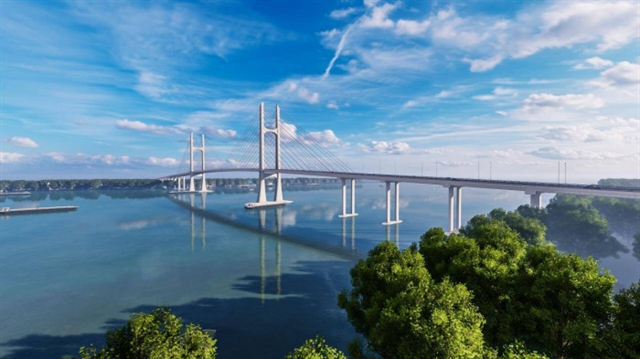.jfif) Opinion
Opinion


|
| An artist’s impression of the Rạch Miễu 2 Bridge project. — VNA/VNS Photo |
Traffic congestion in the Mekong Delta has hindered the socio-economic development of the region for many years. Sài Gòn Giải Phóng (Liberated Saigon) newspaper spoke with Deputy Minister of Transport Nguyễn Duy Lâm on how to address the pressing issue.
Rạch Miễu 1 Bridge is very overloaded with traffic while Rạch Miễu 2 Bridge has only just started construction in Tiền Giang Province, causing traffic congestion in the area. What are the solutions to these problems?
Rạch Miễu 1 Bridge was put into use in early 2009 with an expected traffic volume of some 535,500 cars per year. However, the current traffic volume has increased by 10-13 times.
In 2021, the number of cars crossing the bridge reached more than 5,410,000 with an average of 21,000 cars per day. During the peak seasons like holidays, the number is about 27,000 vehicles per day.
The Rach Miễu 2 Bridge project was started recently in hope of resolving the issue. But the new bridge will take more than three years to complete.
While waiting for the completion of the new bridge, the Tiền Giang Department of Transport in January 2021 set up a temporary Rạch Miễu ferry terminal, crossing the Tiền River and connecting Tiền Giang and Bến Tre provinces, serving vehicles under 30 tonnes.
There is currently only one 100-tonne ferry operating due to low demand. The Ministry of Transport will mobilise more ferries when the demand increases.
Could you update us on the proposal to build the Đại Ngãi Bridge, which will help enhance connection between Mekong Delta provinces and HCM City?
The proposal to build the Đại Ngãi Bridge on National Highway 60 connecting Trà Vinh and Sóc Trăng provinces has been approved by the Prime Minister using Japanese Official Development Assistance (ODA) loans since 2019.
While waiting for the ODA loans from the Japanese government, which is not yet committed, the project is expected to start by the second quarter of 2025 at the earliest.
To speed up the progress, the Government has proposed to the National Assembly to include the bridge in the list of priorities for public investment under the national programme of socio-economic recovery.
The Ministry of Transport, the Ministry of Planning and Investment and agencies are working on the project’s feasibility study and other necessary steps such as site clearance, technical designs and contractor selection in order to start the project as prescribed.
What are your opinions about a recent proposal to collect tolls at expressways built from State capital?
The Ministry of Transport is consulting ministries and Government agencies on collecting tolls at expressway built from the State capital.
The money is expected to help develop more expressway systems, and be spent on maintenance and road repairs.
The government has urged the Ministry of Transport to create a mechanism on toll collection on roads to create capital for transport investment, as well as report to Government agencies to amend and supplement relevant regulations.
Currently, toll rates at some expressways are being collected by the Vietnam Expressway Development Investment Corporation, the Vietnam Infrastructure Development and Finance Investment Joint Stock Company and a number of private investors, with a range from VNĐ1,000 to VNĐ2,100 per km for standard vehicles.
There is currently no regulation on road-use fees collected by toll stations on expressways invested by State capital.
Toll collection aiming at recovering capital from State budget-invested expressways should be adjusted to suit socio-economic policies. However, the toll mechanism needs to be approved by the National Assembly.
The Mekong Delta region plans to complete 19 projects, including 17 road projects, one maritime project, and one inland waterway project by 2025.
Of them, six projects have been completed and put into use, 11 are under construction and two about to begin construction.
From 2025-2030, the region plans to complete an additional 14 road projects, three maritime projects, three waterway projects, four aviation projects and one railway project (HCM City to Cần Thơ), which will help to resolve the traffic problems in the region. — VNS




